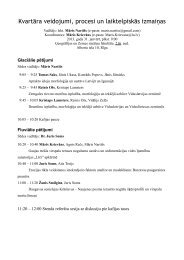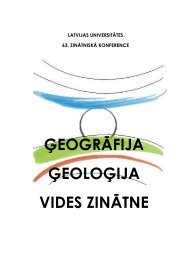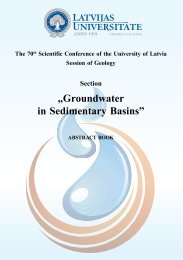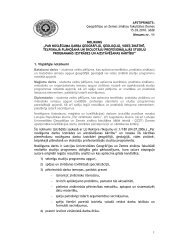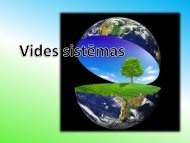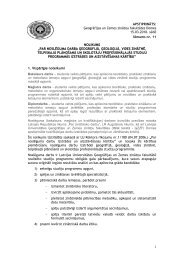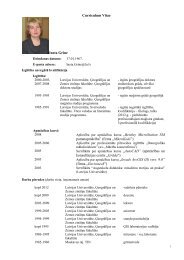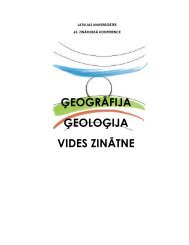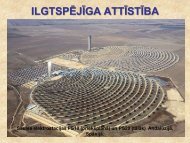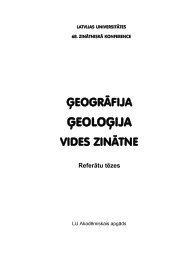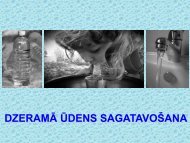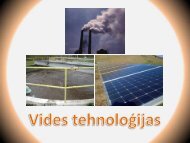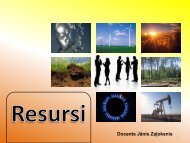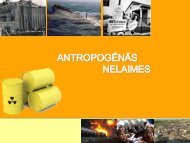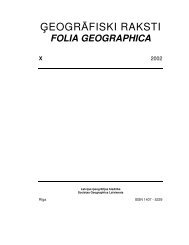eogrÄfiski raksti folia geographica xii - Ä¢eogrÄfijas un Zemes zinÄtņu ...
eogrÄfiski raksti folia geographica xii - Ä¢eogrÄfijas un Zemes zinÄtņu ...
eogrÄfiski raksti folia geographica xii - Ä¢eogrÄfijas un Zemes zinÄtņu ...
Create successful ePaper yourself
Turn your PDF publications into a flip-book with our unique Google optimized e-Paper software.
Small languages – small geography?<br />
The production of knowledge and contemporary challenges<br />
for publishing in geography<br />
Jussi S. Jauhiainen<br />
7<br />
GENERAL TRENDS<br />
Abstract: The article emerges from the debate concerning publishing in geography,<br />
especially regarding internationalism, the language of publishing, and the scope of <strong>geographica</strong>l<br />
journals. English is the most common language of science – though only about 6% of the<br />
inhabitants of the earth speak it as a mother tongue. Increasingly, the evaluation of scientific<br />
activities is based on refereed publications in English at electronic databases (ISI, SSCI, etc.). In<br />
this article I consider the role of Geografiski Raksti/Folia Geographica (GRFG), a <strong>geographica</strong>l<br />
journal published by the Latvian Geographical Society.<br />
In the GRFG a total of 53 articles by 51 different authors was published in 1999-2003.<br />
Human <strong>geographica</strong>l themes dominate over physical <strong>geographica</strong>l ones. The articles have been<br />
predominantly in Latvian (33) but all articles include at least a summary in English and there<br />
are also articles fully in English. English and Latvian make up a total of 84% of all references.<br />
Russian references are few and references in other languages are scarce. Language is significant<br />
in the production of particular <strong>geographica</strong>l knowledge and <strong>geographica</strong>l concepts are often best<br />
expressed in the mother tongue. GRFG is a <strong>un</strong>ique arena for publishing <strong>geographica</strong>l research in<br />
Latvian. Small languages contribute significantly in making great geography.<br />
Keywords: <strong>geographica</strong>l journals, publishing, language, English, Latvia<br />
In the early 21 st century there are more journals than ever available for publishing<br />
geographers’ research findings. The internet has made easier the on-line access to different<br />
journals of geography – at least for people at <strong>un</strong>iversities with institutional agreements.<br />
Publishing has also become a big business and many journals with international range have<br />
been la<strong>un</strong>ched in geography from the 1990s onwards. In the competitive academic world<br />
evaluation of geographers’ activities has increased and one has to become rigorous to publish<br />
and not perish in geography [Jauhiainen 2003].<br />
“Small languages – small geography?” is a deliberately provocative title. This title is<br />
promted to the vivid academic debate that emerged in the early 21 st century concerning<br />
publishing in geography. The debate has evolved in three basic directions: (1) evaluation of<br />
scientific activities and the role of journals in them; (2) questions about internationalism in<br />
<strong>geographica</strong>l journals and practices related to it; and (3) the language of publishing and the<br />
scope of the journals [Hancock 1999; Gutiérrez & López-Nieva 2001; Harris 2001; Samer &<br />
Sidaway 2001; Short et al. 2001; Garcia-Ramón 2003; Gregson et al. 2003; Minca 2003].<br />
In this article I touch on the current debate about <strong>geographica</strong>l publishing from two<br />
viewpoints. First, I present how the institutionalization of geography is intertwined with the<br />
production of particular <strong>geographica</strong>l knowledge. Second, a more specific issue is to consider<br />
the role of Geografiski Raksti / Folia Geographica that is a <strong>geographica</strong>l journal published by<br />
the Latvian Geographical Society.<br />
I discuss here what arguments could favor publishing scientific outcomes of <strong>geographica</strong>l<br />
research in “small languages” such as Latvian. However, despite the “smallness” of the number<br />
of Latvian-speakers compared to many languages (English, Spanish, French, etc., not to<br />
mention Chinese…) it should be remembered that almost 99% of languages spoken today in the<br />
World have less that five million speakers.<br />
Institutionalisation of geography and the production of knowledge<br />
Most geographers as well as many scholars outside the discipline agree that geography is<br />
a particularly challenging field of inquiry. Its scale reaches from the intimate thoughts, body and



